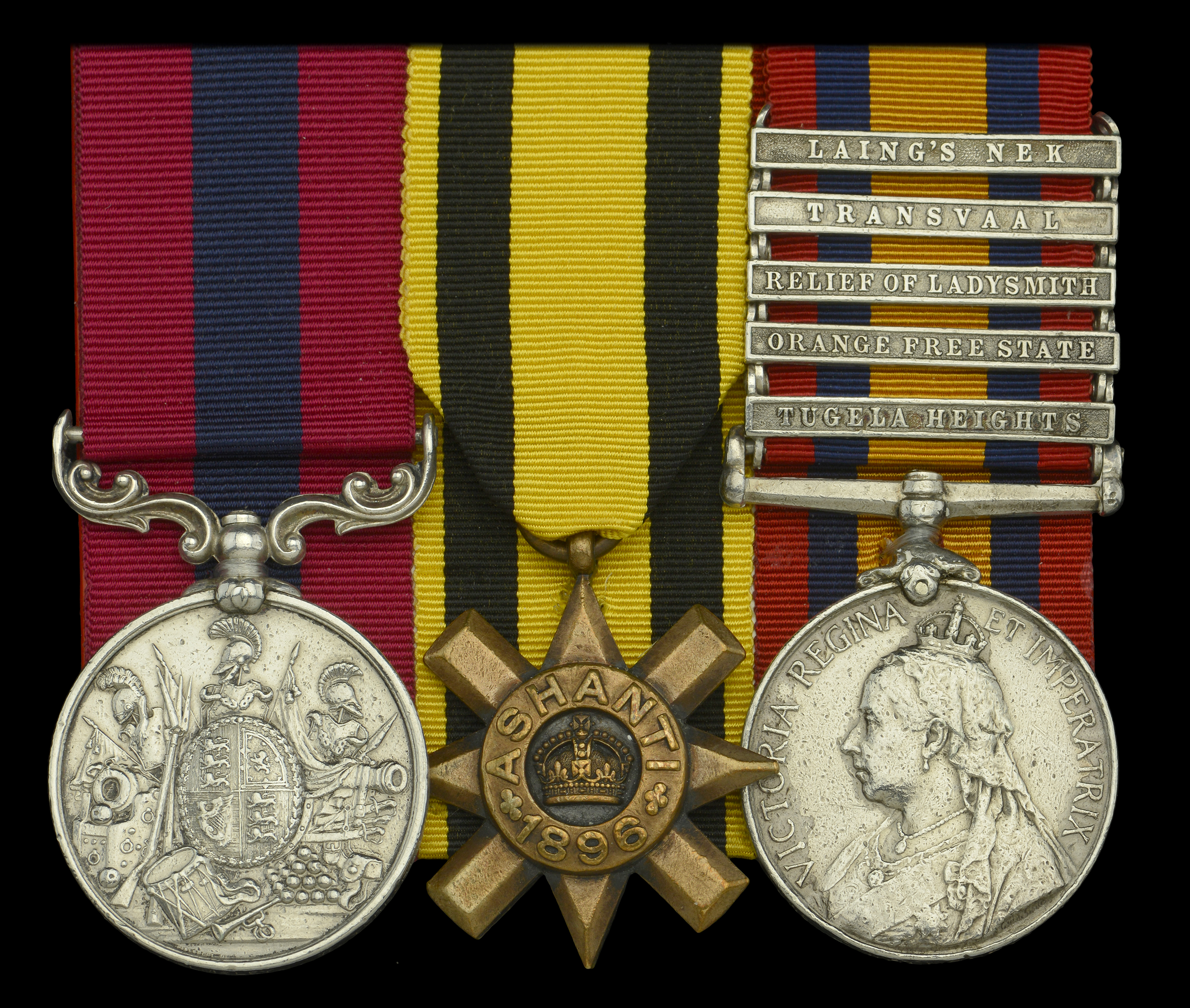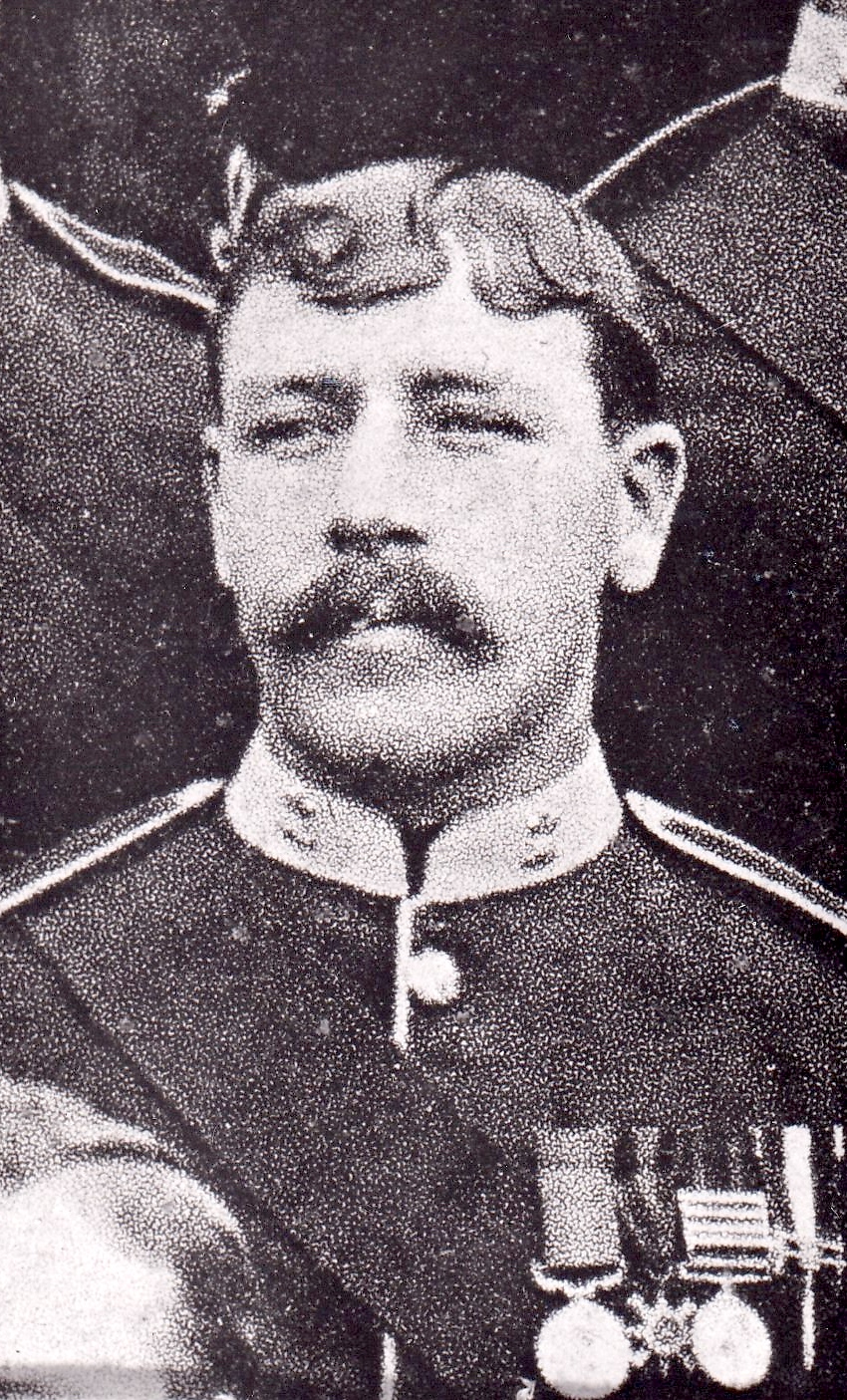The Ashanti Star was awarded in 1896 to those members of the expedition under Colonel Sir Francis Scott, against the Ashantis under King Prempeh, from 26 December 1895 to 4 February 1896. The expeditionary force consisted of 420 Officers and men of the 2nd Battalion, West Yorkshire Regiment; a composite battalion made up of between 16 and 26 men from the three regiments of Foot Guards and eight Infantry Regiments; detachments of Royal Artillery, Royal Engineers, Army Medical Corps, Army Ordnance Corps, and Army Service Corps; the 2nd West India Regiment; and locally recruited Hausa forces. The Ashanti Star was designed by Queen Victoria’s youngest daughter H.R.H. Princess Beatrice, Princess Henry of Battenberg, whose husband died of fever during the campaign, and was issued unnamed; however, Colonel A. J. Price, the Commanding Officer of the 2nd Battalion, West Yorkshire Regiment, had the Stars awarded to his battalion engraved on the reverse at his own expense. A Boer War ‘Advance on Laing’s Nek’ D.C.M. group of three awarded to Sergeant A. Walmsley, 2nd Battalion, West Yorkshire Regiment, for his gallantry whilst in charge of the Maxims of the Battalion Distinguished Conduct Medal, V.R. (3325 Serjt: A. Walmsley. W. Yorkshire Regt.); Ashanti Star 1896 (3325 L. Cpl. A. Walmsley 2. W. Yorks R.) reverse inscribed in the usual Regimental style; Queen’s South Africa 1899-1902, 5 clasps, Tugela Heights, Orange Free State, Relief of Ladysmith, Transvaal, Laing’s Nek (3325 Corl. J. [sic] Walmsley, W. York: Regt.) initial officially corrected, mounted court-style for wear, heavy pitting and contact marks, suspension on QSA broken and crudely repaired, therefore fine and better (3) £1,400-£1,800 --- D.C.M. London Gazette 27 September 1901. Earlier details in the London Gazette, 8 February 1901 state: ‘No. 3325 Lance-Sergeant J. [sic] Walmsley, who distinguished himself [at the advance on Laing’s Nek on 12 June 1900] in charge of the Maxims of the Battalion.’ Arthur Walmsley was born in Blackburn, Lancashire, in 1873 and attested for the West Yorkshire Regiment at Preston on 3 October 1892. He served with the 2nd Battalion during the Ashanti campaign from 11 December 1895 to 23 February 1896, and was promoted Corporal on 1 May 1898. Transferring to the Army Reserve on 3 October 1899, after seven years with the Colours, he was recalled to the Colours less than a week later on 9 October 1899, and served with the 2nd Battalion in South Africa during the Boer War from 20 October 1899 to 15 August 1901, and then again from 11 January 1902 to 10 September 1902 (also entitled to a King’s South Africa Medal with the two date clasps). Promoted Sergeant on 7 February 1901, for his services during the advance on Laing’s Nek on 12 June 1900 he was both Mentioned in Despatches (London Gazette 10 September 1901) and awarded the Distinguished Conduct Medal. After further service in India from 21 January 1904 to 8 December 1906, he was finally discharged at his own request after 18 years’ service on 30 November 1910, after a total of 18 years and 59 day’s service. Sold with a group photographic image of the Warrant Officers, Staff Sergeant, and Sergeants of the 1st Battalion, West Yorkshire regiment, 1906 (in which the recipient is identified, and is wearing his four medals); copied record of services; and other research.






